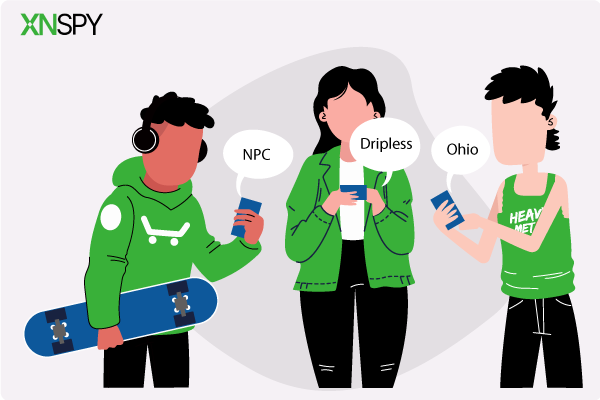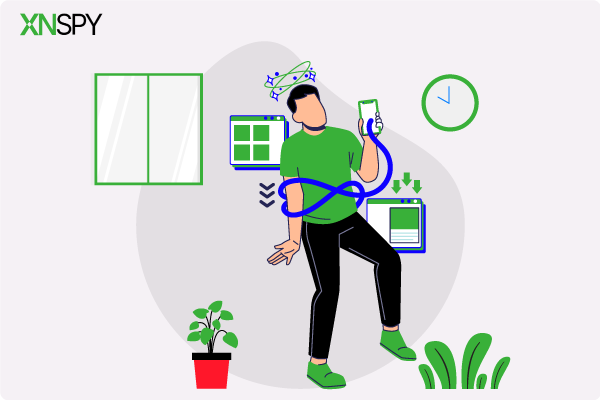The complete monitoring experience for your phone
Get XNSPY and start tracking calls, texts, multimedia, locations and more on any phone!
Get Started Now Live DemoIn a vulnerable digital society, it’s high time for each stakeholder to ensure the online security of our future generation.
The US Surgeon General has been pretty vocal since last year, stressing the growing impact of social media on the mental health of the youth. He said on CNN’s Newsroom, ‘’I, personally, based on the data I’ve seen, believe that 13 is too early to join social media platforms.’’
The proposed warning label will appear once the user logs in and remind them that excessive social media use can risk mental health.
Warning labels are not new and are widely used for other negative elements of society, like cigarettes, alcohol, and drugs. The US General Surgeon expressed that these labels will increase awareness of social media risks and prompt a behavioral change.
On the other hand, medical professionals continue to underline the harmful effects of social media on the minds of adolescents. An official advisory was even issued by the US General Surgeon together with the Department of Health and Human Services.
In the recent column by the nation’s top doctor, one can easily feel the weight of the emotions that his words carried. The words were directed toward all the parents out there who seem to struggle with modern parenting. The more digital advancements we see ever so often, the more our children’s lives are going to be entangled with cell phones and social media.
Let us summarise the major talking points for you
5 Key Takeaways from Surgeon General’s Op-ed
The most critical aspect we face today is that digital dependency is not going away anytime soon, nor will the Gen Z kids abandon it for good. However, the proactive approach of parents as guardians can bring semblance to what is a dynamic but rather risky digital landscape for the kids.
Here are the 5 key points from the op-ed.
1. Screen time among kids has increased exponentially
Teenagers are growing up almost integrated with technology, and it’s no surprise for anyone how much time kids spend on a digital screen. More than 95% of teenagers between 13 and 17 years old use a social media app, with more than a third using it excessively. Compared to adults, children seem to have more time to remain active on the internet and social media for long hours.
2. Legislation on the risky online content the kids are exposed to
The introduction of artificial intelligence has transformed the dynamics of digital technology. Now, social media apps use advanced algorithms to deliver more user-centric results. However, these algorithms expose teens and tweens to misleading ads, adult content, and online abuse. The advisory recommends that social apps introduce age-appropriate safety standards and share reports on how the platform impacts users’ health.
3. Social media companies should be questioned
Tech and social media networks earn billions in revenue and continue to launch fancy features. However, they rarely share information on how social media exposure impacts users, whether adults or teens.
Most social networks claim they have robust security and privacy settings in place, but people are asking for proof. Apps like Snapchat and TikTok allow parents to oversee their kids’ activities. However, kids can easily disable the ‘Family Centers’ without their parent’s knowledge or approval.
4. The minds of children are vulnerable to social media
Social media is addictive for teens, and most of them constantly scroll their timelines, post their statuses, upload pictures, and make comments. However, excessive use can cause them to venture into risk-taking activities. This includes sharing adult content and bullying.
Moreover, adolescence is a tender age when the minds of the youth are still developing. Factors such as bullying, exploitation, FOMO (fear of missing out), and peer pressure can cause all kinds of mental health issues. Research says children who spend more than 3 hours on social media increase the risk of anxiety and depression.
5. Parents need robust ways to manage their children’s screen time
Digital technology is advancing rapidly, and with hectic routines, parents often don’t have time to figure everything out. Ironically, most kids are more tech-savvy than their parents. This is why these kids easily evade the ordinary parental controls that most parents seem to apply.
Screen time monitoring of kids is necessary not only at home but everywhere. Parents need a robust monitoring app to gather screen time data and insights into how kids interact on social media and what searches they make on the internet.
The US Surgeon General’s Tips for Parents
Kids are using social media way earlier before they can grasp the intricacies of the digital medium. More than 40% of kids aged 8 to 12 are active on social media platforms. The surgeon general stressed that the pressure parents have in battling this excessive use is very much real and concerning.
Cell phones are necessary for communicating with the kids, whether they are at a friend’s house, at sports practices, or at summer camp. However, it’s hard to know what games they play, who they interact with, and what searches they make. The remedies are present but hard to implement, particularly when the kids become teenagers.
Here are valuable tips for the parents
i. Develop a family usage plan
Two-thirds of parents say parenting is way harder than it was twenty years ago. This is the reason why the American Academy of Pediatrics (AAP) recommends that parents develop a family media plan. The major points should be screen/online time, content boundaries, and avoiding sharing personal information.
Search the ratings and age-suitability of apps and programs before allowing them to the kids. Include a list of consequences for those who do not follow the rules, and ask kids when deciding the consequences. Review the plan after 6 months.
ii. Model a responsible behavior
Young children try to mimic their parents in various aspects, including online behavior. Besides limiting your own use, you must teach kids how to use social media responsibly. Tell them how to post inspiring information, learn new skills, and make friendly connections. Keep your profile private to limit strangers from viewing the content or media you post or share.
iii. Introduce tech-free zones in the house
Adequate rest and physical activity are key to developing a healthy personality. However, rampant cell phone use can limit natural growth. Establish screen-free zones and times in the house to ensure time for physical conversation and indoor games.
Include a list of tasks and chores to complete before devices can be used. Set time limits for smartphone usage so kids know when to stop and transition away.
iv. Empower the kids
The early teenage years are tricky, as most kids run high on adrenaline and want to test their freedom and limits. You need to instill pertinent knowledge of the digital landscape before your child creates social media accounts and searches the Internet independently.
The emphasis needs to be on the risks associated with online activity. Have regular talks with the child about their online experiences, who they connect with, and how they adjust their privacy settings.
How XNSPY Monitoring App Helps Implement the Right Digital Strategy
Digital media technology is regularly advancing, making it difficult to police. Parents’ first fix is to use the parental controls available in most apps and devices. However, these have limited features to control the amount and type of content the kids are consuming.
What you need is a robust solution to manage threats as big as cyberbullying, exploitation, exposure to adult and hate-based content, doxxing, and phishing.
Fortunately, XNSPY is an all-purpose parental control app with diverse monitoring features and tools. The app covers all the loopholes that can expose kids to the downside of social media and internet browsing.
a. Social Media Monitoring
XNSPY scans and logs interactions on more than ten different social media apps, including Facebook, Instagram, Snapchat, Viber, Tinder, iMessage, Skype, Kik, Line, Signal, and Telegram. The features let you
- View sent and received messages along with any shared media.
- Access the name and number of the people they communicate with
- The date and time stamp of all the messages exchanged
- Set alerts for issues such as cyberbullying and sexual content
- Get insights on the text inputs and the extent of personal information the child shares
b. Web History Monitoring
XNSPY’s internet history tracking provides a complete list of all the websites the child searches and visits. The app logs URLs opened in Incognito mode and even web history that the child deletes from the phone. Going through the list of websites can be time-consuming, so XNSPY lets you view the 10 most visited URLs and get access to those that the child has bookmarked.
c. Screen Time Management
Use XNSPY to find out your child’s total screen time. The detailed pie chart accurately depicts the child’s time on the phone. The app details the time spent on individual apps and the five most frequently used apps. You can use the information to help the child disconnect from the phone and spend time in other healthy activities.
XNSPY is available on most Android and iOS cell phones, and installation is hassle-free. Once installed, the app will discreetly record your child’s cell phone movements and upload them to the remote servers. You can remotely view the data and identify any questionable pattern of their online activity.
Conclusion
Smartphones and social media are becoming ubiquitous and mainstream every day, making it difficult for anyone to control them. Children are growing up in a digital setting surrounded by addictive apps, inappropriate content, and advanced algorithms. The US General Surgeon claims there is adequate evidence that shows social media is posing a threat to the mental health of adolescents.
Social media warning labels will help spread awareness among youth who actively interact on social media apps. However, merely a warning label will not suffice, and every stakeholder needs to play their part. Tech companies must implement content policies for teenagers, and parents need to use a purposeful monitoring app like XNSPY to access their children’s online activities.


